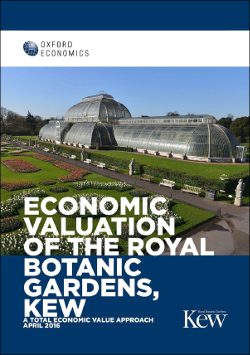Ungated Post | 01 Apr 2016
Economic Valuation of the Royal Botanic Gardens, Kew

This study assesses the total economic value generated by the Royal Botanic Gardens (RBG), Kew. It considers a range of benefits, including the value accruing to visitors; the value attributed to Kew by non-users; educational benefits for visiting students; and productivity benefits which result from RBG Kew’s scientific research. We find that RBG generated a total of £182 million of economic value for the UK in 2014/15. A further £8 million of value accrues to international visitors and students.
This valuation should be regarded as conservative since it does not incorporate some important areas of RBG Kew’s work, such as the ‘insurance’ value and potential future economic value of species held in RBG Kew’s scientific collections; the benefits of increased planting activity encouraged amongst the wider UK population; and the international value of RBG Kew’s scientific research. The latter, in particular, could be very substantial, both because of the large contribution Kew makes to the infrastructure upon which large swathes of plant biology research around the world rely, and because much of RBG Kew’s conservation and other applied work primarily benefits other countries.
Oxford Economics’ team is expert at applying advanced economic tools that provide valuable insights into today’s most pressing business, financial, and policy issues.
To find out more about our capabilities, contact:
Americas
Diantha Redd
+1 (646) 503 3052
Email
Asia Pacific
Peter Suomi
+65 6850 0110
Email
EMEA
Aoife Pearson
+44 (0)203 910 8054
Email
Related Services

Post
The economic impact of abandoning the WTO
Oxford Economics have been commissioned by the International Chamber of Commerce (ICC) to provide an independent assessment of the economic impact of WTO dissolution. This report details our findings and the assumptions underpinning our analysis.
Find Out More
Post
The economic impact of the sports activities of public service media
This study shows how the sports activities of public service media supported €4.5 billion of GDP and 57,000 jobs across 31 European countries in 2022. The report also highlights wider economic benefits of public service media sports coverage, such as the way in which it leverages sponsorship income for sports bodies.
Find Out More
Post
Global Trade Education: The role of private philanthropy
Global trade can amplify economic development and poverty alleviation. Capable leaders are required to put in place enabling conditions for trade, but currently these skills are underprovided in developing countries. For philanthropists, investing in trade leadership talent through graduate-level scholarships is an opportunity to make meaningful contributions that can multiply and sustain global economic development.
Find Out More